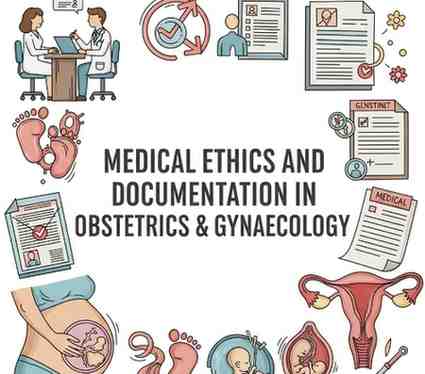
Your Account
Designed by Zeptt Technologies

Obstetrics and Gynaecology involve highly sensitive and intimate aspects of a woman’s health.
Ethical conduct and proper documentation ensure patient safety, autonomy, trust, and legal safeguarding of both patient and practitioner.
Classical Ayurvedic texts also stress the importance of ethics and accountability in physician conduct.
IMPORTANCE OF MEDICAL ETHICS
DEFINITION OF MEDICAL ETHICS
Medical ethics refers to the principles and guidelines that govern the behavior of healthcare providers toward their patients, society, and profession.
ETHICAL PRINCIPLES IN OBSTETRICS & GYNAECOLOGY
Autonomy – Respecting the patient’s decision-making rights in reproductive choices, contraception, labour management, etc.
Beneficence – Acting in the best interest of the mother and fetus.
Non-maleficence – Avoiding harm through informed procedures like episiotomy, caesarean section, etc.
Justice – Providing equal care irrespective of socio-economic status, caste, religion, etc.
Confidentiality – Keeping patient records, HIV status, abortion history, and sexual health private.
AYURVEDIC ETHICAL GUIDELINES
Ethics in Ayurveda are well defined under the role of Vaidya Dharma.
The physician should be of shuddha acharana, dayalu, and nishkaama.
SANSKRIT REFERENCE
सुश्रुतसंहिता सूत्रस्थान 1/15
“शौचं दया दाक्ष्यं विज्ञानेऽभ्यास आसक्तिः |
शास्त्रेषु शक्तिर्भवति चिकित्सकस्य ||”
(Meaning: A physician must possess cleanliness, compassion, skill, dedication to knowledge, and expertise in the science.)
MODERN ETHICAL ISSUES IN OBSTETRICS & GYNAECOLOGY
Female feticide and sex-selective abortions.
Consent in caesarean section or hysterectomy.
Surrogacy, IVF, and donor insemination ethics.
Termination of pregnancy (MTP Act).
Teenage pregnancies and decision-making autonomy.
Ethical dilemmas in emergency obstetric care.
IMPORTANCE OF MEDICAL DOCUMENTATION
DEFINITION OF MEDICAL DOCUMENTATION
The systematic recording of patient history, clinical findings, diagnostic test results, treatment plans, operative notes, and discharge summaries.
AYURVEDIC INSIGHT ON DOCUMENTATION
Though traditional Ayurveda was orally transmitted, documentation was emphasized in terms of "tantrayukti", "pramana", and systematic case descriptions.
SANSKRIT REFERENCE
चरकसंहिता सूत्रस्थान 30/26
“दृष्टं श्रुतं अनुभूतं युक्त्युपलब्धं च यद्भवेत् |
तच्च चिकित्सायां युक्तं तत्सर्वं धर्म उच्यते ||”
(Meaning: That which is seen, heard, experienced, or logically inferred is the foundation of righteous practice and documentation.)
NEED FOR DOCUMENTATION IN OBSTETRICS & GYNAECOLOGY
To maintain medical and legal accountability.
To ensure continuity of care across obstetric and gynaecological stages.
For proper record of antenatal, intrapartum and postnatal care.
To document consent before surgical interventions like caesarean, hysterectomy, tubectomy.
Helps in medicolegal defense in maternal or fetal mortality.
Important in research, audits, and insurance.
For public health data collection – maternal mortality rate, fertility statistics, etc.
IMPORTANT DOCUMENTS IN OBG PRACTICE
Case sheet
Consent form
Partograph
MTP and abortion record
Ultrasound reports
Histopathology reports
Family planning registers
Birth and death certificates
Neonatal record
MODERN REFERENCE (BASED ON STANDARD TEXTBOOKS)
As per DC Dutta’s Textbook of Obstetrics and Gynaecology, medical documentation is crucial for:
Informed consent
Risk-benefit explanation
Proper history-taking and examination record
Accurate reporting of investigations and treatments
Labour room documentation (Partograph)
Operative notes and post-operative instructions
MTP Act compliance
Medico-legal case documentation
LEGAL AND ETHICAL LAWS RELATED TO OBG
MTP Act, 2021 – Permits abortion up to 24 weeks under specific conditions.
PCPNDT Act, 1994 – Prevents sex determination and female feticide.
Surrogacy (Regulation) Act, 2021
ART Regulation Act, 2021
Consent under Indian Penal Code Section 87, 88, and 89 – Applicable in OBG surgeries.
Medical Negligence and Compensation Law – Case reference: Samira Kohli vs Dr. Prabha Manchanda.